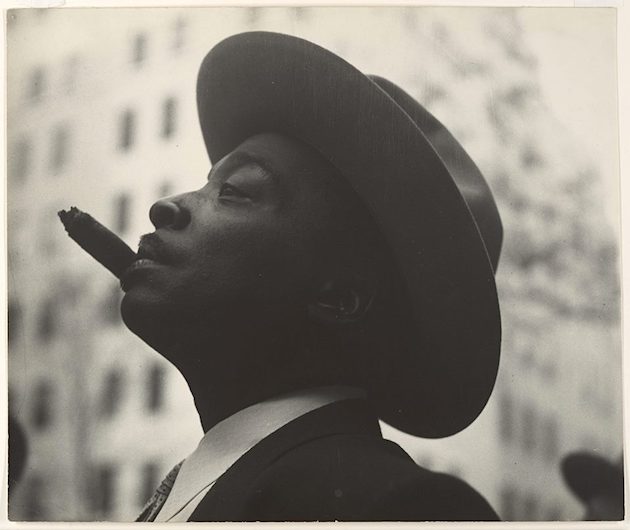
Boris Ignatovich Moscow At the Hermitage, Leningrad 1930

US new daily cases look sort of okay, as a trendline, when you watch the past 2 months. But they have crossed the 6 million figure now, as global cases are gunning for 25 million, and the trend there is much less positive.
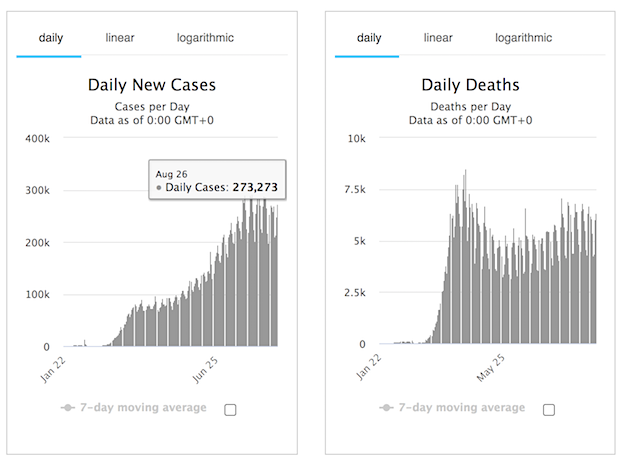
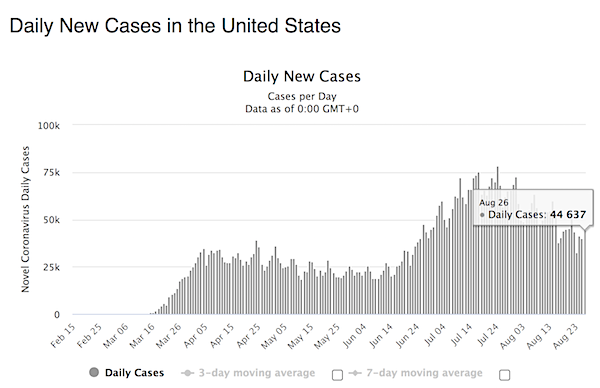

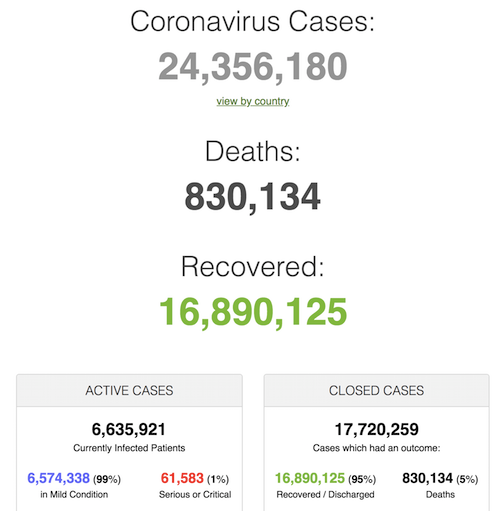

We don’t do jobs

Be safe.
• Hurricane Laura Makes Landfall as Cat. 4 Storm, Moves Inland (WC)
Laura is near the extreme southwest Louisiana coast and tracking to the north-northwest at about 15 mph. The hurricane is a Category 4 and steady weakening is now expected through the morning hours. Laura’s maximum sustained winds jumped from 75 mph to 140 mph in the 24 hours ending 1 p.m. CDT Wednesday. That increase in maximum sustained winds easily meets the definition of rapid intensification in a hurricane. Hurricane conditions are ongoing in southwestern Louisiana. More than 9 feet of storm surge is inundating the coast near Cameron, Louisiana. A water level station at Eugene Island, Louisiana reported about 3.2 feet of inundation above ground level early Wednesday afternoon and a wind gust of 45 mph.
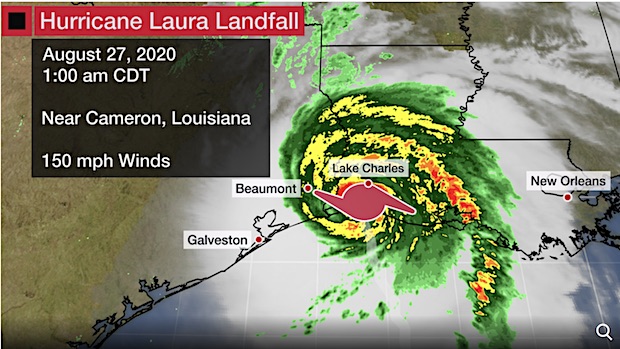
A 133 mph gust and an 85 mph sustained wind were measured in Lake Charles early Friday morning. A 127 mph wind gust was measured early Thursday morning at Calcasieu Pass, Louisiana and a sustained wind of 93 mph was recently measured in Cameron, Louisiana. NOAA’s Storm Prediction Center has issued a tornado watch valid until 8 a.m. CDT for parts of Louisiana and southeastern Texas. The watch area includes Baton Rouge, Alexandria, Lake Charles and Beaumont. Laura has prompted hurricane and storm surge warnings for the northwest Gulf Coast.
A storm surge warning is in effect from Freeport, Texas, to the mouth of the Mississippi River in southeast Louisiana, including Galveston Bay and areas inside the Port Arthur, Texas, hurricane flood protection system. This means a life-threatening storm surge is expected in the next 36 hours. Residents in these areas should heed all evacuation orders and instructions from local emergency management and take necessary precautions to protect life and property.
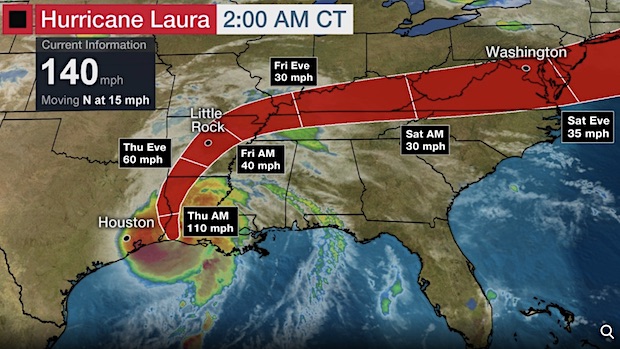
Read more …

Rasmussen is changing fast.
• Biden’s Polling Lead Has Collapsed (Palumbo)
Just a month and a half ago, Rasmussen Reports had Joe Biden 10-points ahead of President Donald Trump in the polls. Now he’s only ahead by one point, within the margin of error. Even if Biden’s now-slim lead in the polls were to remain frozen as of today, Trump would still have a clear path to an electoral college victory, as Hillary Clinton lead Trump in the popular vote by just over two points in the 2016 election. While it is impossible to know the exact reason (or reasons) for Biden’s polling collapse, it comes as the economy continues to rebound from the coronavirus, riots continue to ravage liberal run cities longer than anyone expected (to no condemnation from Joe Biden and Kamala Harris), and a Democrat National Convention widely viewed to be a snoozefest was held.
It’s hard to imagine how anyone could’ve had their mind changed by the extended Zoom meeting that was the DNC, but the RNC is changing hearts and minds – or at least some. Of note, Rasmussen was among the closest mainstream pollster in approximating the popular vote in the 2016 election. Rasmussen had Hillary Clinton up 1.7 points over Trump on election day 2016, while she ended up winning the popular vote by 2.1 points above him (48.2% vs. 46.1%). The Real Clear Politics average of polls had Hillary up for six points. Unlike the other polls, Rasmussen correctly saw Trump had a path to victory in the electoral college.
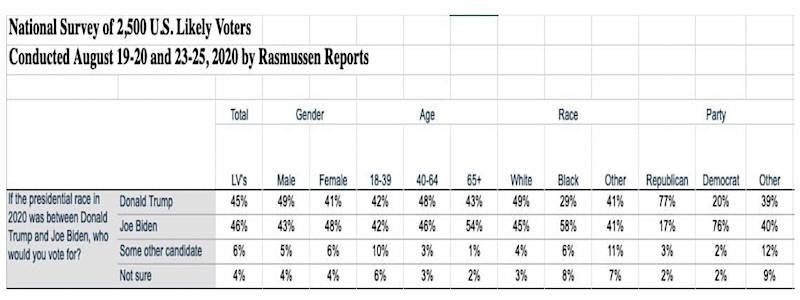
Read more …

The tables are starting to turn. Is it just the riots? Or should I ask again if Dems really want to win?
• Trump Job Approval Rating Hits Record At 52%, Up With Blacks, Even Dems (WE)
Buoyed by blacks and independent voters, as well as urban dwellers shocked by the Black Lives Matter protest violence raging in some cities, President Trump’s approval rating has hit a new high, according to a survey heavy with minority voters. The latest Zogby Analytics poll just shared with Secrets had Trump’s approval at 52%. “The president has recorded his best job approval rating on record,” said pollster Jonathan Zogby. What’s more, his approval rating among minorities was solid and, in the case of African Americans, shockingly high. Zogby said 36% of blacks approve of the president, as do 37% of Hispanics and 35% of Asians. Approval among independent voters is also up, to 44%. And “intriguingly,” said Zogby, 23% of Democrats approve of Trump.
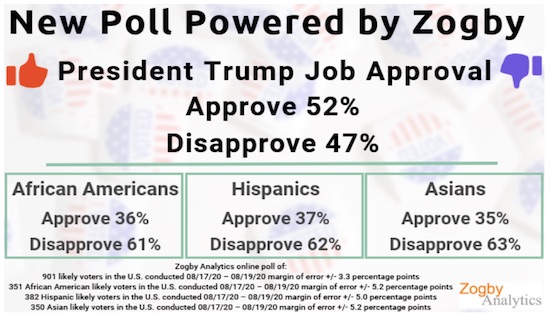
It was the latest to show that Trump’s approval went up during the Democratic National Convention. Rasmussen Reports had it at 51% at the end of the convention. In a shock from past election years, Joe Biden got no convention poll bounce, according to a newly released Reuters/Ipsos poll. The Republican National Convention still has two days to go. Last night’s address by first lady Melania Trump won good reviews. Tonight, Vice President Mike Pence speaks, and Thursday is Trump’s night. Pollsters have been somewhat at a loss to explain the rise of Trump’s approval ratings, considering that there has been little positive news to help his standings other than the peace deal he helped negotiate between Israel and the United Arab Emirates.
Zogby, in his analysis, took a stab at the reasoning. First, he said, his and other polls are confirming that the nation is nearly evenly divided politically and that despite some showing a big Biden lead, the race is extremely close. He suggested that the battle is for the “10%-20%” who haven’t made their minds up on whom to vote for and who likely won’t make up their minds until Election Day, just like in 2016. “We are as polarized a nation, on a level not seen since the Civil War,” said Zogby. He also said that the violence playing out in cities such as Kenosha, Wisconsin, and Portland, Oregon, are pushing urban voters to Trump.
Rasmussen
Read more …

This should happen in many countries. Familes have a right to know.
• DOJ Asks Four States For COVID Data On Nursing Home Deaths (JTN)
The Justice Department on Wednesday requested COVID-19 data from four states it says required nursing homes to accept residents infected with the coronavirus, policies that may have rendered elderly Americans “unnecessarily put at risk.” The department said in a Wednesday press release that it was seeking “COVID-19 data from the governors of states that issued orders which may have resulted in the deaths of thousands of elderly nursing home residents.” The department named New York, New Jersey, Pennsylvania, and Michigan as the states in question.
Data indicate that a significant percentage of all COVID-19 deaths worldwide—possibly approaching half of all fatalities—have been in long-term care facilities, locations where advanced ages and chronic medical conditions make patients much more vulnerable to infectious diseases. The Justice Department notes that in late March New York State ordered that “no resident shall be denied re-admission or admission to [a nursing home] solely based on a confirmed or suspected diagnosis of COVID-19.” “Protecting the rights of some of society’s most vulnerable members, including elderly nursing home residents, is one of our country’s most important obligations,” Assistant Attorney General for Civil Rights Division Eric Dreiband said in the press release.
“We must ensure they are adequately cared for with dignity and respect and not unnecessarily put at risk.” The requests “are not accusations of fault or wrongdoing by the states or any other individual or entity, and the department has not reached any conclusions about these matters,” the department noted. The letters to the four state governors request various types of state-run nursing home-related data, including the number of residents and staff of such homes that contracted COVID-19, the number of deaths at the homes, and “all State-issued guidance, directives, advisories, or executive orders regarding admission of persons to Public Nursing Homes.”
Read more …

Keto. Ditch sugar, ditch carbs. Someone open a chain of keto restaurants.
• Obesity Increases Risk Of COVID19 Death By Almost 50% (G.)
Obesity increases the risk of dying of Covid-19 by nearly 50% and may make vaccines against the disease less effective, according to a comprehensive study using global data. The findings, which the lead researcher described as “scary”, show that the risks for people with obesity are greater than previously thought. The study, commissioned for the World Bank, will increase pressure on governments to tackle obesity, including in the UK where Boris Johnson has put himself at the head of a drive to reduce the nation’s weight. The prime minister hit out last year at “sin taxes” such as the UK’s sugary drinks levy, but his own spell in intensive care with Covid-19, which he blames on his weight, has convinced him that tough measures are needed to reduce obesity levels.
It is understood that even taxes are no longer off the table. The US and UK have some of the highest obesity rates in the world. US government data shows that more than 40% of Americans are obese. The figure in England is more than 27% of adults. The new study from the University of North Carolina at Chapel Hill into the effects of Covid-19 on people with obesity, defined as a BMI over 30, finds they are at greater risk from the virus in every way. Their risk of ending up in hospital with Covid-19 increases by 113%, of needing intensive care by 74%, and of dying of the virus by 48%. The study was led by Prof Barry Popkin, of the department of nutrition at the UNC Gillings Global School of Public Health, who said he was shocked by the findings. The risk of dying of Covid-19 for people with obesity was significantly higher than anyone had thought.
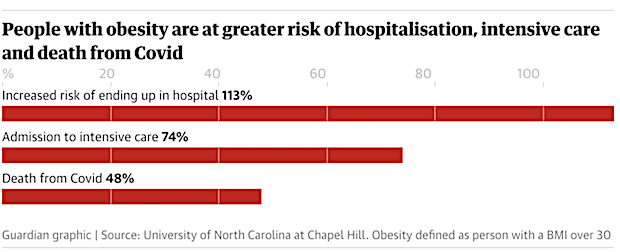
“That’s a pretty big effect for me,” he said. “It is a 50% increase essentially. That’s a pretty high scary number. All of it is actually, much higher than I ever expected.” The risk of being admitted to hospital for people with obesity was doubled, he said. “That, ICU admission and mortality are really high. They all shocked me, to be honest.” The study, published in the journal Obesity Reviews, is a meta-analysis, bringing together data from many studies carried out around the world, including China, France, Italy, the UK and the US. Obesity is a global problem that no country has yet successfully tackled. People with obesity often have underlying medical conditions that put them at greater risk from the coronavirus, such as heart disease and type 2 diabetes. Obesity can also cause metabolic changes, such as insulin resistance and inflammation which make it harder for the body to fight off infections.
Read more …

“Cotton and polyester masks were slightly less effective, but were still able to block at least 80% of droplets.”
“Polyester and cotton masks allowed up to 40% of the smaller droplets to escape.”
The whole mask thing is made so complex by the “experts” and the media that nobody understands it anymore, so you got all these people walking the steets with masks on, where they serve zero purpose, and people in confined spaces, where they do, wearing none and clamoring about their liberty and birth rights. Some things we can still figure out ourselves. Wear the things where they are appropriate, but only there.
• Non-Woven Masks Better To Stop COVID19, Says Japanese Supercomputer (G.)
Face masks made from non-woven fabric are more effective at blocking the spread of Covid-19 via airborne respiratory droplets than other types that are commonly available, according to modelling in Japan by the world’s fastest supercomputer. Fugaku, which can perform more than 415 quadrillion computations a second, conducted simulations involving three types of mask, and found that non-woven masks were better than those made of cotton and polyester at blocking spray emitted when the wearer coughs, the Nikkei Asian Review said. Non-woven masks refer to the disposable medical masks that are commonly worn in Japan during the flu season, and now during the coronavirus pandemic.
They are made from polypropylene, and are relatively cheap to make in large numbers. Woven masks, including those used in the Fugaku simulation, are typically made from fabrics such as cotton, and appeared in some countries after non-woven versions were temporarily in short supply. They can be reused and generally offer more breathability but, according to the World Health Organization (WHO), should be washed in soap or detergent and water of at least 60C at least once a day. The non-woven variety blocked nearly all droplets emitted in a cough, according to experts at Riken, a government-backed research institute in the western city of Kobe.
Cotton and polyester masks were slightly less effective, but were still able to block at least 80% of droplets. Non-woven “surgical” masks were slightly less effective at blocking smaller droplets measuring 20 micrometres or less, with more than 10% escaping through gaps between the edge of the mask and the face, according to the computer model. One micrometre is one millionth of a metre. Polyester and cotton masks allowed up to 40% of the smaller droplets to escape. [..] Makoto Tsubokura, team leader at Riken’s centre for computational science, encouraged people to cover up despite the heatwave gripping large parts of Japan.
“What is most dangerous is not wearing a mask,” Tsubokura said, according to the Nikkei. “It’s important to wear a mask, even a less effective cloth one.” Fugaku, which was named the world’s fastest supercomputer last month, has also run simulations on how respiratory droplets spread in partitioned office spaces and on packed trains when the carriage windows are open. Although it will not be fully operational until next year, experts are hoping the 130bn yen ($1.2bn) supercomputer will help identify treatments for Covid-19 from about 2,000 existing drugs, including those that have yet to reach the clinical trial stage.
Read more …

No, you don’t get to change your ideas every other day just because you call yourself an expert.
This has nothing to do with COVID19 specifically. This is a general virus issue, and we could have defined these things well before the pandemic. And some people did.
• 6 Feet May Not Always Be Enough Distance To Protect From COVID19 (NBC)
The current guidance for safe social distancing may not be enough to stop the spread of COVID-19, a new analysis suggests. In the report, researchers from the Massachusetts Institute of Technology and the University of Oxford say other factors, such as ventilation, crowd size, exposure time and whether face coverings are worn, need to be considered, as well. Since the beginning of the pandemic, the advice has been to keep at least 6 feet away from other people indoors and outdoors. “COVID-19 spreads mainly among people who are in close contact (within about 6 feet) for a prolonged period of time,” according to the Centers for Disease Control and Prevention.
However, in the report, published Tuesday in The BMJ, the researchers wrote that “physical distancing should be seen as only one part of a wider public health approach to containing the covid-19 pandemic.” Lydia Bourouiba, an associate professor of civil and environmental engineering at MIT and co-author of the report, said, “It’s not just 6 feet and then everything else can be ignored or just mask and everything else can be ignored or just ventilation and everything else can be ignored.” It’s important to distinguish between high-risk and low-risk exposure, Bourouiba said.
Some evidence suggests that the coronavirus may travel more than 6 feet through activities like coughing and shouting, the researchers wrote. In the highest-risk situations, such as indoors with poor ventilation, large crowds, prolonged contact time and no face coverings, distancing beyond 6 feet should be considered. Locations that fall under this category include bars, stadiums or restaurants. In low-risk scenarios, such as in outdoor spaces with few people nearby, less stringent social distancing should be adequate.
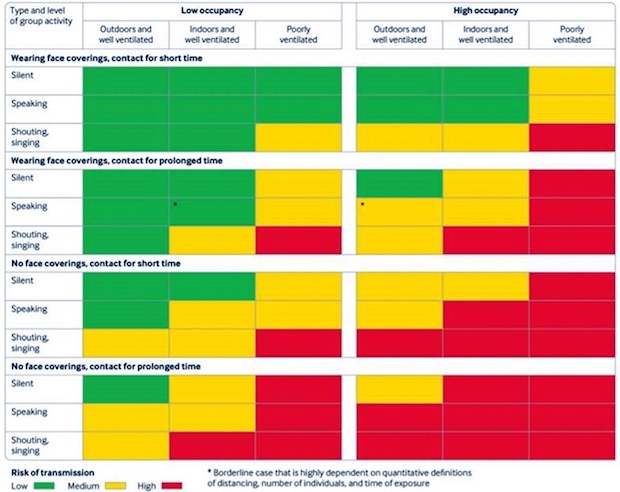
Read more …

Nobody is testing HCQ, azithromycin or doxycycline, and zinc (“triple therapy”) appropriately.
• The Tragic Hydroxychloroquine Debate and Dr. Fauci’s Denial of Evidence (RCP)
There are well-established criteria for when an observed association can be ascribed to causation, which Dr. Risch meticulously took into consideration. These criteria were originally developed by the pioneering British epidemiologist Sir Austin Hill. Thus Dr. Risch’s scientific inference of the treatment efficacy of administering HCQ, azithromycin or doxycycline, and zinc (“triple therapy”), as early as possible in outpatient settings to people at greatest risk, in order to prevent the SARS-CoV-2 infection from turning into a dangerous life-threatening “florid disease” is sound. In an open letter to Dr. Anthony Fauci, George C. Fareed, MD, of Brawley, California, Michael M. Jacobs, MD, MPH, of Pensacola, Florida, and Donald C. Pompan, MD, of Salinas, California, demonstrate the flaws in the positions adopted by NIH and FDA and give strong support to Dr. Risch. In particular, they criticize the nihilism of demanding proof of efficacy from randomized clinical trials (RCTs), when time is short and when highly suggestive observational proof of the efficacy of these inexpensive drugs exists.
In the past, the FDA has approved many drugs without RCTs; penicillin was so efficacious in the treatment of pneumonia that there was no need for an RCT to have penicillin registered. Perhaps most disturbing is that not a single RCT is designed to test the efficacy of the triple therapy in outpatient settings as early as possible among those most at risk. Nevertheless, the official position is that “the overwhelming evidence from properly conducted RCTs indicates no therapeutic efficacy of HCQ,” though the RCTs are simply designed not to answer the right question: whether the triple therapy prevents deaths among the elderly and those with comorbidities when taken in outpatient settings, even before people are notified about the lab result as to whether they have Covid-19. It cannot be ethical for public health bodies to demand impossible standards of proof for potential lifesaving therapies.
[..] Dr. Fauci’s position seems remarkably similar to that of the famous English statistician Ronald A. Fisher, who, in 1957, denied that tobacco smoking caused lung cancer, despite evidence of the strong statistical relationship. Fisher argued vehemently that observational data cannot prove causality. It is disturbing that Dr. Fauci does not engage in honest scientific debate based on observational evidence but rather resorts to personalized attacks. As Dr. Risch put it: “The pushback has been furious. Dr. Anthony Fauci has implied that I am incompetent, notwithstanding my hundreds of highly regarded, methodologically relevant publications in peer-reviewed scientific literature.”
Read more …

Yes, the Lancet screwed up badly.
• What Is Gilead’s Role In The War On Hydroxychloroquine? (Chaves)
Is Gilead, the maker of Remdesivir, waging war on HCQ (hydroxychloroquine)? Attacks on the drug have been continuous ever since Dr. Didier Raoult used this quinine derivative to save the lives of COVID-19 patients last March. The first attempt to discredit HCQ was a hastily compiled Veterans’ Administration hospital system study last April. Notably, one of the study’s authors had in the past received numerous grants from Gilead, with one grant in 2018 totaling nearly a quarter of a million dollars. After deep flaws in the V.A. study were exposed, Surgisphere came to the rescue in May with a “15,000 patient” megastudy allegedly compiled from hospitals all over the world.
This strategy succeeded: following its publication in the Lancet and the NEJM, all outpatient use of HCQ was severely restricted in the U.S., Australia, and most of Europe. When the Surgisphere scam was exposed, both articles were quietly retracted, and the editor-in-chief of the Lancet tried to wash his hands of this embarrassing incident by denouncing Surgisphere’s “monumental fraud.” However only a few days earlier, Lancet editors played a major role in persuading the WHO to suspend all trials for HCQ. Who put them up to it? The study’s main author, Mandeep Mehra, also apologized for his reliance on a third party for the data. He may not have known that the data were fabricated, but the hospital he directed was conducting two trials for Remdesivir. Was he under pressure from his sponsors?
These are the stakes: a five-day treatment with Remdesivir costs around $3,000. A five-day supply of generic HCQ costs around $10. Drug companies have every right to recoup their cost of research and development, but lobbying to suppress access to a life-saving treatment that is both cheaper and more effective is a crime against humanity. Progressives mistakenly believe that socialized medicine protects patients from the abuses of big pharma, but the first nation to severely restrict access to HCQ was France. This policy compelled Dr. Raoult to testify against Gilead’s disproportionate leverage over the medical community during a meeting of the French National Assembly last June.
Notably in the U.S., a third of the FDA’s budget comes from pharmaceutical user fees, and according to the NIH’s website, eight out of 55 members of the panel responsible for COVID-19 treatment guidelines are currently affiliated with Gilead. These government ties to Gilead more than triple when you include panel members with past associations.
Read more …

We need to stop looking in the rear view mirror only. Some things will never return. And the more we try to hold on to them, the harder it gets to replace them with other things.
• Airlines Threaten October Jobs Massacre Unless they Get 2nd Bailout (WS)
October 1 and the days that follow are going to be rough in terms of tens of thousands of well-paid service jobs – that’s what airlines are threatening unless they get another $25-billion bailout. Airlines have been trying to shed employees by offering packages that induce employees to depart voluntarily because the $25-billion bailout package under the CARES Act banned “involuntary” furloughs or layoffs through the end of September. The air passenger business is still down roughly 70% in the US, six months after the initial collapse of traffic began, according to TSA airport screenings of air travelers entering into security zones. And demand has hardly improved any since early July, and airlines continue to slash costs and cash-burn to survive:
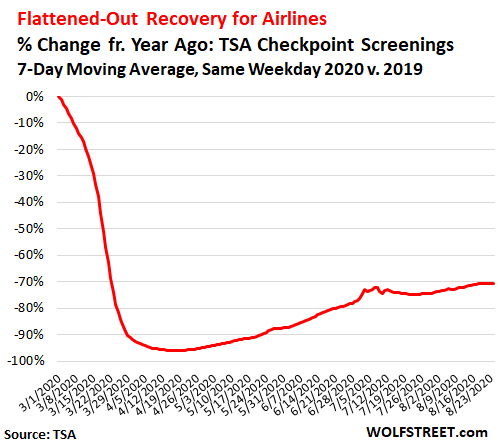
“It was assumed that by Sept. 30, the virus would be under control and demand for air travel would have returned. That is obviously not the case,” American Airlines CEO Parker and President Robert Isom told employees in a grim message on Tuesday. Under its buyout, early retirement, and long-term leave-of-absence programs, 23,500 employees had already voluntarily departed. But that wasn’t enough. So the executives told employees what the next step would be: 19,000 “involuntary” furloughs on October 1. American, which started the year out with about 140,000 employees, expects to have fewer than 100,000 employees in October. “The one possibility of avoiding these involuntary reductions on Oct. 1 is a clean extension” of the bailout package, they said.
So if given another bailout, American, which received $5.8 billion under the first bailout package, will then not lay off those employees on October 1 – but instead on the date when the second bailout package would expire? In the fourth quarter, American expects to fly only one-fourth of its usual international schedule and less than half of its usual domestic schedule. Last week, it announced that it would pull out of 15 smaller cities in October, “as a result of low demand and the expiration of the air service requirements associated with the Coronavirus Aid, Relief and Economic Security (CARES) Act. This is the first step as American continues to evaluate its network and plans for additional schedule changes in the coming weeks.”
Read more …

Greece is not impressed with EU and US support so far.
• France & Italy Throw Weight Behind Greece As Naval War Games Kick Off (RT)
France, Italy, Greece and Cyprus are staging a massive maritime exercise in the Eastern Mediterranean, in an apparent veiled nod to Turkey, which recently began researching oil and gas deposits in the area, raising ire in Athens. Codenamed ‘Eunomia’, the aeronautical exercises launched on Wednesday off the southern shores of Cyprus, the host nation of the war games. Athens’ defense minister announced the start of the drills earlier in the day, saying they are to reinforce “the rule of law as part of the policy of de-escalating tensions.” France, in turn, also confirmed the news, having dispatched its ‘Lafayette’ frigate, as well as three Rafale fighter jets. Italian and Cypriot vessels were also said to have joined the exercise in the eastern part of the Mediterranean.
A day prior, separate drills kicked off near the Greek island of Crete, this time involving Hellenic and US armed forces. The string of military exercises appears to be upping the ante in the festering feud between Greece and Turkey. Formally allies within NATO, the two nations have been at loggerheads over a number of issues, from historical discords to overlapping territorial claims in the Eastern Mediterranean. Tensions recently flared up when a trove of gas and oil was discovered in the contentious waters. This week, Ankara announced that its Oruc Reis research vessel will carry on navigating the disputed waters between Cyprus and Crete. The news has caused outrage in Greece which views the research activities as unlawful and considers them an affront to its sovereignty.
Read more …

More revolving doors. Just what we needed. Taleb has addressed this.
• The New Media Elite Are Rapacious Monopolists, And We Are Their Food (Lewis)
The likes of Facebook & Google are spending tens of millions on lobbying and buying up government insiders. We need to call their bluff and bring in controls over their ever-growing financial and networked empires. In recent weeks, there has been heightened media concern that Facebook is cultivating a close relationship between government and big tech monopolies by poaching and recruiting former senior policy officials. The findings reveal a systematic hiring of government insiders with knowledge of regulation by offering them huge incentives to join. Three senior regulatory staff at the UK’s Department for Culture, Media and Sport are among those who recently joined Facebook. Other policy officials joined from the Cabinet Office, the Home Office and UK Counterterrorism Policing.
And earlier this year, it was revealed that Facebook had recruited Tony Close as their new director of content regulation. Close was Ofcom’s director of content standards, who had been heavily involved with drawing up rules to rein in the tech giants and protect the public. And, of course, do not forget the fact that Facebook recruited former UK Deputy Prime Minister Nick Clegg as its vice president for global affairs and communications, who has been leading Facebook’s policy and communications work, as part of a concerted effort to preach and lobby against Big Tech breakups. But it is not only Facebook that is behaving like this. The Times reports that at least 14 special advisers had moved to tech companies, including Uber, Google and Facebook, in the past five years after a stint in ministerial offices.
These officials have had access to departmental chiefs and the policy formation process. In the face of growing concern about online content and antitrust investigations, the monopolistic positions of Silicon Valley’s Big Tech giants have increasingly come under scrutiny. As a result, they have all been ramping up their lobbying capacities by recruiting well-connected insiders. The Wall Street journal revealed that in 2019, Facebook increased its expenditure on lobbying by nearly 25 percent, to $12.3 million, through the first nine months of the year. Amazon notched a 16 percent jump in lobbying outlays, to $12.4 million. Apple boosted its spending by eight percent, and Microsoft by nine percent.
The main goal of this is the protection of their existing and future businesses. When Facebook announced its move into the financial sphere by unveiling plans for a global cryptocurrency, it drew a barrage of trenchant criticism. Undaunted, it hired seven new outside lobbying firms to work on financial issues, including two former aides to the GOP chairman of the Senate Banking Committee. Amazon, too, has brought on seven additional outside lobbying shops since the middle of 2018, including former members of Congress and congressional aides who work to influence federal spending.
Taleb Carney
Read more …

Got to love the simplicity: “Painting one blade black dramatically reduces bird kills by wind turbines..”
• Good News for Birds – and Wind Power (Adler)
Birds have been a problem for wind power. Wind turbines, whatever their other merits, have the tendency to kill birds, and possibly bats. This has been a longstanding problem, particularly because those areas best for wind power are often important for birds, particularly those species that tend to ride on wind currents. The bird problem has meant that environmental organizations have been inconsistent advocates of wind power, endorsing the such carbon-free power in the abstract, but often opposing particular wind power development proposals. I wrote about this problem over twenty years ago in The Weekly Standard, and it has not gone away.
New research suggests that one solution to the bird problem is rather simple: Painting one blade black dramatically reduces bird kills by wind turbines–70 percent in one location under study. This is an important development because the effect appears quite large, and it’s a relatively inexpensive fix. Assuming this research pans out, there is a cheap way to address the biggest environmental drawback of wind power, and that’s a big deal.
Read more …

“..everyday life influences what you dream about and vice versa..”
• Your Dreams Are A Continuation Of Your Reality (RT)
A groundbreaking new study of over 24,000 dreams has provided the strongest evidence yet that our dreams are a continuation of our waking lives, with certain recurring elements shared between our sleeping and everyday selves. “Most dreams are a continuation of what is happening in everyday life,” say the researchers led by computer scientist Alessandro Fogli from Roma Tre University in Italy. The scientist explained that everyday life influences what you dream about and vice versa. So anxiety in life leads to anxious dreams, while on the positive side, dreaming can help solve problems that present themselves during waking hours.
On the one hand, traditional psychological analysis of dreams dates back to the days of Freud, who posited that the hidden meanings of dreams could be revealed through analysis of their waking experiences in the real world. On the other hand, modern dream analysis looks for symbols, metaphors, structures and characters which might correspond to other parts of a person’s life. Such methodologies include the Hall and Van de Castle system, which codifies all of the aforementioned elements and explores how they interact with each other in the dreamworld. This is, however, an extremely slow and time-consuming process, as evidenced by Christopher Nolan’s film Inception.
Dream scientists have long sought an algorithmic solution to automate the task of sifting through dream reports, the academic equivalent of counting sheep, which is exactly what Fogli and his team undertook to accomplish at scale. The researchers devised a way to track large numbers of dreams at scale, by parsing the language from dream reports of 24,000 dreams contained in a giant public database called DreamBank. More specifically, they honed in on characters, social interactions, and emotional words to search for recurring patterns. These three dimensions are considered the most important aspects of dream interpretation, defining the overall “plot.”
Read more …

We try to run the Automatic Earth on donations. Since ad revenue has collapsed, your support is now an integral part of the process.
Thank you for your ongoing support.

Zschaepitz USD debasement

Biden clown. Don’t know who made it, but it’s done well.

And this is just some stupid fun:
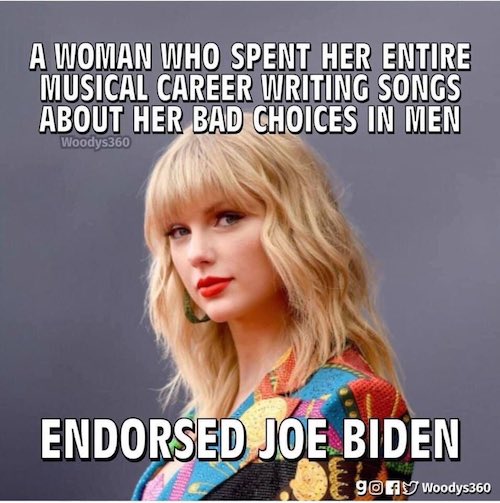

Support the Automatic Earth in virustime.

